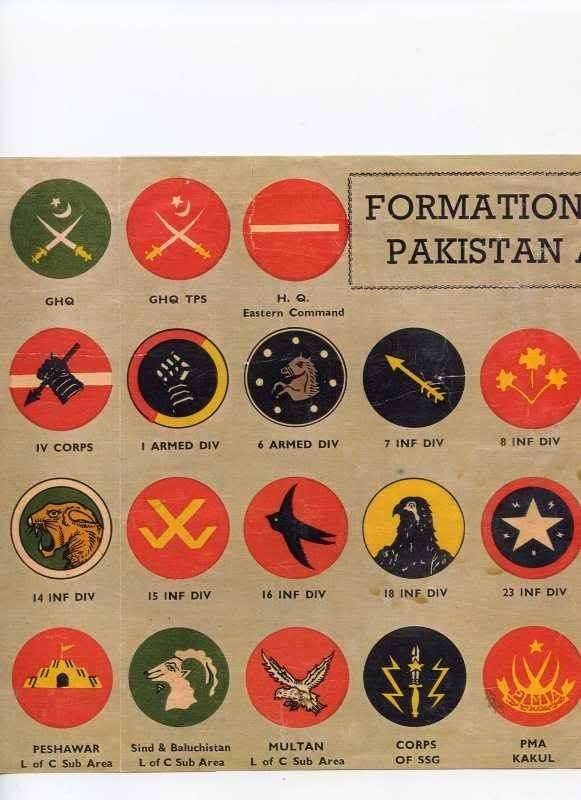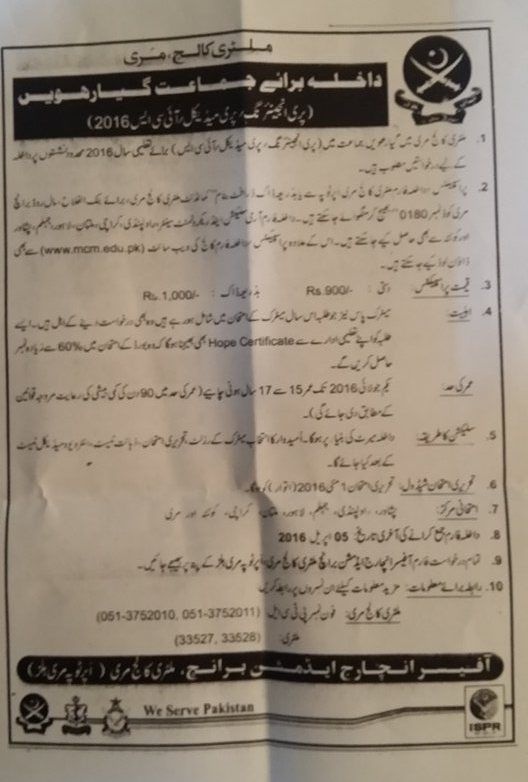Principle of Selection:
The task in the selection of Armed forces of Pakistan is mainly to ensure that suitable man is selected for a job. The principle of selection of an officer is to measure the fitness of an individual for the efficient performance of a job. The stress in selection is therefore, laid on officer-like qualities like dynamic attributes, leadership characteristics, co-operative attitude, social adjustment and capability to influence and convince others.
The nature of Selection Tests:
The modern selection technique of the ISSB observes and evaluates the candidates in three various fields by three separate and independent examiners. The “Psychological Tests” are conducted by the psychologist: “G.T.O.” by the Group Testing Officer, and “Personal Interview” by the Interviewing Officer. The procedure of the selection tests shows that the candidate is separately evaluated by the Psychologist, the Group Testing Officer (G.T.O.) and the Interviewing Officer in his respective tasks. He should not be therefore hesitant that his performance in each of these tasks does not inhibit or adversely influence his performance in the other tasks. In case the candidate finds some deficiency in any task, therefore he must not feel digusted, but must strive to show his better skill in other tasks. The candidate must always seek for securing the best possible position in the merit list, because the final selection and call up for training are made from the merit list according to the merits of the candidates. The aim of the candidate must therefore be not only to be get selected at the ISSB but also to obtain the maximum possible merit, so that he may secure a high distinction in the merit list. After separate assessment of each candidate in the three fields, the three different testing officers convene a conference for the final measurement of the ability of the candidate. There further must appear in appropriate dress as demanded by the Board. Good, fit and suitable dress impresses the examiners. It also helps in producing a favourable impression on the minds of his fellow competitors.
Generally the Psychological Tests commence as soon as the candidates arrive at the Board and there is little time or opportunity for the candidates to change their dresses. The written tests take a fairly long time and it is therefore beneficial that the candidates are comfortably dressed.
White shorts shirt, white shorts, white canvas shoes and white socks, etc. are suitable for the G.T.O. Tasks. The candidates are allowed to wear pull-over or coats in winter. The dress may not be expensive or showy but it should be fitting, neat and clean. The candidates must take note of the ting that they would be wearing the Chest Numbers on top of the dress during all the tests.
Be Fit:
If you are preparing for a physical efficiency test, you will probably practice for weeks before you will be physically fit to compete in the test. But you will not like to do anything of this sort for the Intelligence and Psychological Test. You should realize that the state of your body can markedly influence your score in the mental tests. If you are tired, worried or sleepy, you will not be able to give a good account of yourself. In order that both you and your country derive the greatest benefit from these it is important that a true picture of your abilities be obtained.
You will be given tests of similar nature at the various Public Service Commissions and Services Selection Boards. There will be a lot of other details which you will have to attend before you get these sorts of tests. You may find yourself rather tired on the first day. So go to sleep early and get up with a fresh mind next day. You will do well in the tests.
It is possible that with all the talk about such tests, you may start worrying about the results. This is not good. You should try to do your level best and not be worried in advance. If you start fresh, with vigour and zeal, you will find yourself on top speed on the day of examination.
Follow Directions:
Listen to all the directions you are given. Follow them closely. The few minutes before the test are extremely valuable. You should not spend them in conversation.
When you are told to read directions printed on the examination sheet, do so and follow them carefully. Remember that the ability to understand and follow directions is one of the evidences of “intelligence.”
Looking over the Test:
This is a good chance to get an idea of how long the test is. If you know how many questions the test contains and how much time you are given in which to answer all the questions, you will be able to make a rough programme for yourself. For example, if you have to answer 90 questions in 30 minutes, then your average speed should be answering about 3 questions every minute. In fact, you should do better than this, because the chances are that the latter questions will be harder than the earlier ones, and will consequently put a check mark next to it, so that if you have the opportunity of going back over the test you can immediately located the questions which were not answered. If you are in doubt about a questions put a question mark next to it so that you can come back to it later when you have some ideas about the subject. Remember you time is limited and do not spend any unnecessary time on a single question.
A very common mistake in such examinations is to put the proper answer in the wrong place. This is particularly apt to happen when you are in a hurry, as you will be. It is bad enough to make errors or not to know the answer to a question, but it is worse to know the correct answer and to be marked wrong, just because the right answer appears in the wrong place.
Examination Material:
It may not seem important but you can save a lot of time and trouble if, just before the test, you make sure that you have all the examination material. Examine your question booklet until you are sure that its contains everything it is supposed to and that it marks are allowed by each examiner to the candidate. In case the grand total of marks secured by the candidate exceeds the prescribed minimum, then he is declared as successful. Thereafter a merit list is prepared and is sent to the GHQ Rawalpindi for final selection. The GHQ fills up its required vacancies by selecting the candidates out of the merit list in order of merit.
SELECTION PROCEDURE FOR ISSB
Call-ups for ISSB.
The candidates who qualify themselves in the Preliminary Selection viz. Preliminary Interview, Written Test, and Physical Fitness; are called-up by the concerned ISSB. These call-ups contain some instructions which must be complied with. The candidates must reach at the indicated centres and places at the given times. Representatives of the Selection Board contact the candidates at these places and take them to the ISSB’s in military transports.
SCHEDULE OF WORK AT ISSB
Reporting Day:-
a. Reception.
b. Checking of Documents.
c. Allotment of Chest Numbers.
d. Candidates are photographed.
e. completion of forms.
f. Writing of unforgettable incident.
1st Testing Day:-
PSYCHOLOGIST’S
a. Intelligence Tests.
b. Psychological Tests.
2nd Testing Day:-
(GTO’s Day)
a. Group Discussions
b. Group Planning.
c. Progressive Group Tasks.
d. Half Group Tasks.
e. Interview.
3rd Testing Day:-
(GTO’s day)
a. Individual Obstacles.
b. command Task.
c. Final Group Task.
d. Mutual Assessment.
e. Interview.
(Left Overs)
4th Testing Day:-
(Conference Day)
a. Conference
b. Re-interview, if required.
c. Payment of TA/DA.
d. Departure.
RESULT:
The results are conveyed to the candidates by post, within a week after completion of their tests at I.S.S.B.
LEADERSHIP QUALITIES:
All the three selectors assess the candidates in the following leadership qualities:-
1. Planning ability 2. Courage
3. Emotions 4. Determination
5. Responsibility 6. Integrity
7. Practical sense 8. Initiative
9. Social relations 10. Influencing ability
11. Self-confidence 12. Physcial endurance
13. General awareness 14. Expression.
Selectors
1. Psychologist
2. Group Testing Officer (GTO)
3. Deputy President
General helping hints for candidates.
The ISSB imparts much importance to the proper behaviour of the candidates during the period of tests. The candidates must demonstrate good behaviour. He must handle the furniture, fittings, recreational aids and other property with much care and must avoid its damage or breakage. They must be mindful of their behaviour both inside the ISSB and outside in town, during sight-seeing etc. they must not invite any complaints against them. They must know the discipline is the service watch words and an aspirant for a commissioned post in the Armed Forces. The candidates are expected to be well disciplined persons.
Dress:
The intimation concerning the dress both during tests and non-tests hours is generally noted in the call-up instructions of the ISSB. The candidate is not defective in any way. Glance quickly through the test to see that all the print is clear and that no pages are missing. If you have to stop in the middle of your work and bring some defect to the attention of the examiner your trend of thought will be broken and valuable time will be wasted.
Guessing:
Guessing is a poor practice, because examiners generally penalize you for wrong answers. Guess as little as possible.
Speed
Do not spend to much on a single question. The test contains more questions that you or anybody else can answer in the allotted time, so do not be worried if you are unable to finish all of them. However, in order to get high marks you should answer as many questions as possible. One way of doing this is to leave a question if it appears that you will not be able to arrive at the correct answer readily. For example, if you are bad in mathematics and good in vocabulary, your best course will be to skip over all numerical problems as much as possible and work on the vocabulary.





